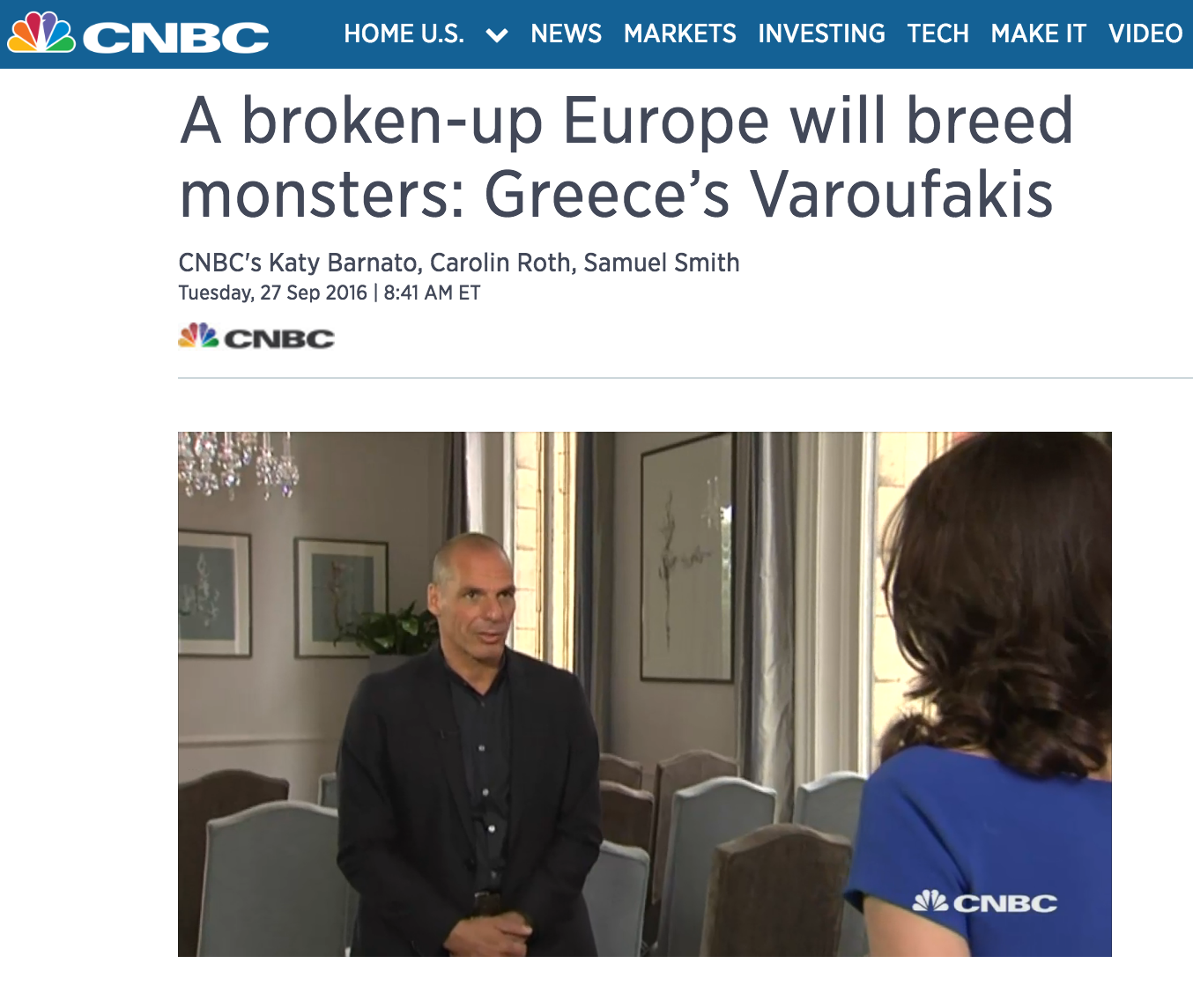
Europe is disintegrating and this could come at great human cost, Greece’s fiery former finance minister warned on Tuesday.
“The great fear is that the disintegration of the European Union — whatever you may think about the European Union — is going to come at a very, very large human cost,” Yanis Varoufakis told CNBC in London.
“That kind of Europe is one that breeds monsters. It is not the kind of Europe that the world needs,” he later added.
He spoke to CNBC at a time of heightened tension in the European Union (EU), due to the U.K.’s vote to quit the bloc in June and disagreement as to how to handle the influx of refugees fleeing the chaos in Iraq and Syria.
“I wish Brexit had not happened,”
Varoufakis told CNBC on Tuesday. He advocated the U.K.’s exit from the EU began promptly, to prepare the ground for a Norway-like engagement with the bloc.
“What matters is we give business and citizens a degree of certainty,” Varoufakis told CNBC on Tuesday.
A desire for greater control of immigration numbers is viewed as one reason why the majority of Britons voted to quit the European Union in June.
“Open boarders are conducive to a better economy and better society,” Varoufakis told CNBC on Tuesday.
Varoufakis served as Greece’s finance minister in 2015 as a member of the ruling left-wing Syriza party. He bridled many of his European colleagues in Greece’s negotiations on its rescue package, particularly after he likened the country’s creditors to terrorists.
He eventually left government under pressure from Syriza Prime Minister Alexis Tsipras.
Varoufakis has also criticized the EU’s handling of refugees. He told CNBC in March that Turkey and Greece must not become a “large concentration camp for hapless refugees.”
One million refugees and migrants cross the Mediterranean Sea in 2015, with the vast majority arriving in Greece, according to the United Nations. At least 3,771 people drowned or went missing on the way.
Greece’s economic straits make it hard pushed to provide services like shelter, food, hygiene and family reunification assistance to the influx of people. In April 2016, the European Commission announce initial funding of 83 million euros ($93 million) for emerging support projects for refugees in Greece.
Varoufakis has been busy since quitting government. Earlier this year, he launched the pan-European DiEM25 to make European institutions more democratic and transparent. His academic background is in economics and he is currently a professor at the University of Athens, according to his LinkedIn profile. In March, he confirmed he was also advising Jeremy Corbyn, the hard-left leader of the U.K.’s Labour Party, on an informal basis.
The Greek economy is seen shrinking once again this year, this time by 0.3 percent, according to European Commission figures. The economy shrunk each year on an annual basis between 2008 and 2013, before posting narrow growth in 2014 and a narrow contraction of 0.2 percent in 2015.
“Politics disintegrates when the economy is unsustainable,” Varoufakis warned on Tuesday.
However, Tsipras has forecast Greece’s economy will grow by 0.2-0.4 percent this year, according to Reuters.
Around one-quarter of the adult population in Greece is without work, with unemployment seen averaging 24.7 percent in 2016, according to the European Commission, slightly lower than 24.9 percent last year.
Public debt as a proportion of gross domestic product (GDP) is predicted to rise to 182.8 percent this year. However, the budget deficit is expected to fall back to 3.1 percent, from 7.2 percent in 2015.
The country has received three international bailouts since 2010, following the euro zone debt crisis. In June, the European Stability Mechanism (the euro zone’s bailout fund) disbursed 7.5 billion euros ($8.4 billion) of the 10.3-billion-euro second tranche of its latest Greece support program.
Negotiations are now ongoing between Greece and its European and International Monetary Fund (IMF) supervisors about the timing of the next bailout installment.
As usual, Greece’s European neighbors are urging the country to speed up on the economic reforms on which the bailout is conditional. However, the IMF is warning that the program may be unrealistic without debt relief for Greece and that this could jeopardize its involvement.


















